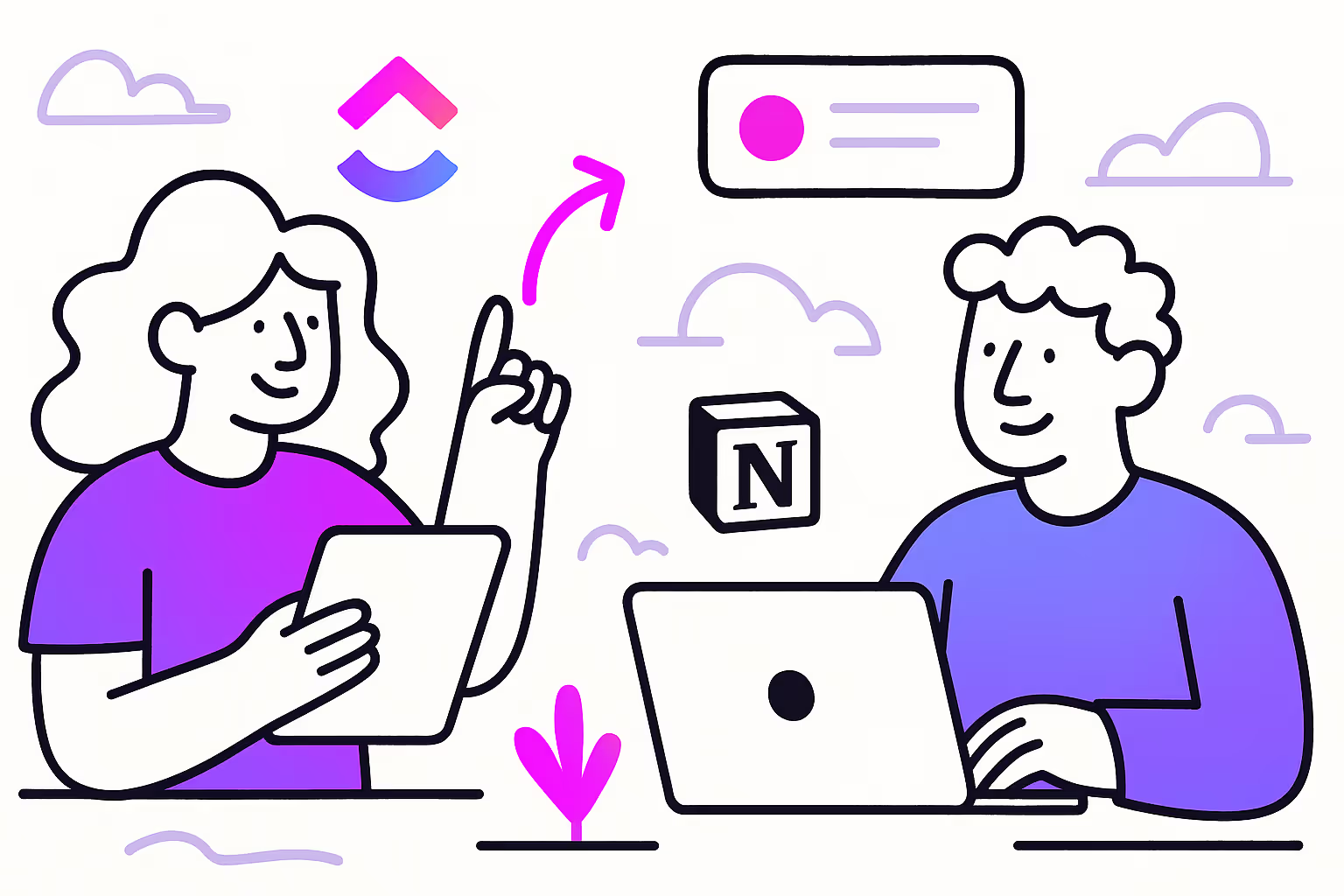The market for project management software continues to grow rapidly as teams seek all-in-one tools to coordinate work and increase productivity. In the past, tasks management, docs and roadmaps were scattered across tools like Google Docs, Trello and Excel. Gone are the days of standalone, single-function productivity tools. The modern era introduces comprehensive solutions, with ClickUp and Notion leading this transformation.
However, ClickUp and Notion take very different approaches that appeal to different users. ClickUp excels in project management and task automation. It offers a range of features for organizing and tracking projects effectively. Notion, on the other hand, stands out for its adaptability. It provides a highly customizable interface, suitable for everything from personal note-taking to complex team coordination.
This in-depth comparison of ClickUp vs Notion examines how both platforms align to specific needs across 12 key differentiation criteria. We’ll cover pricing, reporting, permissions, integrations, and much more. By the end, you'll better understand the strengths and limitations of both ClickUp or Notion to determine the ideal fit for your projects in 2024 and beyond.
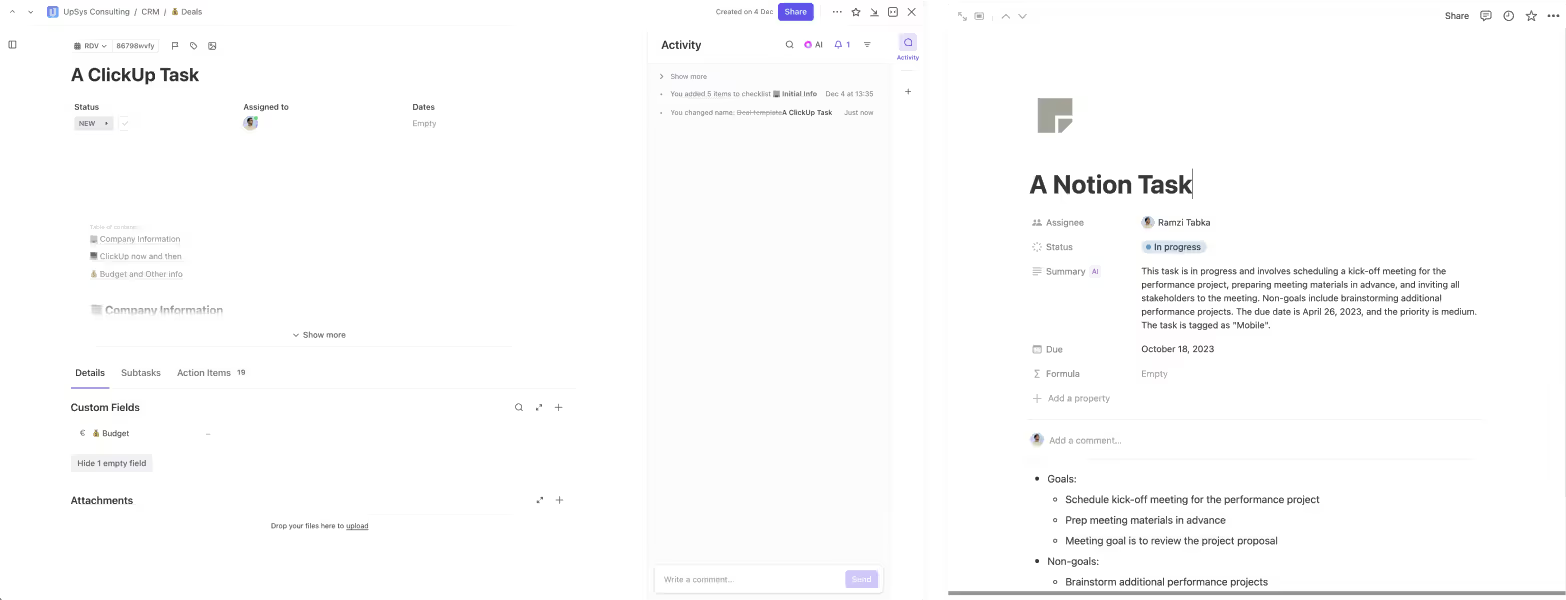
ClickUp Task vs Notion task
Key Takeaways:
- Core Strengths: ClickUp is optimal for comprehensive project management and task automation, while Notion shines in adaptability and customization.
- User Suitability: ClickUp is ideal for teams seeking extensive project tracking and automation tools; Notion is best for those needing flexible note-taking and project organization.
- Comparative Overview: Explore detailed comparisons across pricing, user experience, features, integrations, and more to determine which platform best suits your specific project management needs.
How do ClickUp and Notion Compare in Project Management?
ClickUp and Notion offer distinct advantages for project management. ClickUp provides a comprehensive suite of tools for detailed task management and automation, making it suitable for larger teams with complex projects. Notion, with its highly customizable interface, excels in managing information and coordinating projects in a more flexible manner, ideal for personal use or smaller teams. Understanding their differences in features, pricing, and user experience will help you choose the right tool for your team's requirements.
ClickUp vs Notion Pricing: Which Offers Better Value?
ClickUp Pricing: Detailed Breakdown of Plans and Costs
As of 2023, ClickUp offers 4 paid pricing tiers:
- Free Forever: Basic free version includes 100 MB storage, 5 workspaces, unlimited tasks. Best for personal use and small teams.
- Unlimited Plan: $7 per user/month (annual billing). Unlocks team features like custom fields, dependencies, Gantt charts. Ideal for growing small businesses.
- Business Plan: $12 per user/month (annual billing) adds advanced permission controls, goal tracking, priority support. Targets mid-sized teams.
- Enterprise Suite: Requires contact for custom quote. Caters to large enterprises needing security, audit logs, API access.
Notion Pricing: Plans and Costs Explained
Notion also provides 4 pricing plans:
- Personal (Free) Plan: Best for individual use, providing essential features with limitations.
- Plus Plan: $8/month (annual billing) for unlimited file uploads and version history.
- Team Plan: $15/member/month (annual billing) for teams needing collaborative tools and administrative controls.
- Enterprise Plan: Custom pricing for large organizations requiring advanced security and administrative features.
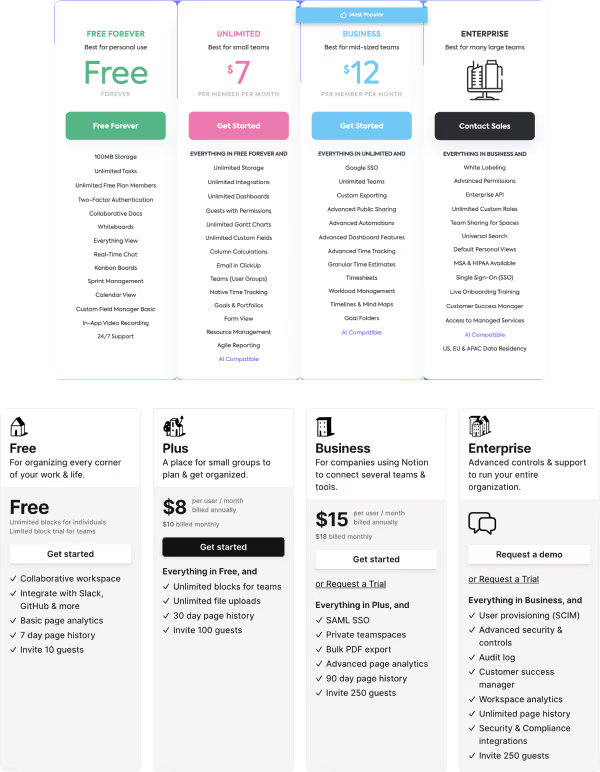
ClickUp vs Notion pricing
Verdict: Tie
In terms of pricing, ClickUp and Notion both offer free versions for basic needs and premium plans for expanded functionality. In the value-for-money analysis, ClickUp generally provides superior capabilities for the cost, especially once you progress past entry-level plans. We talk more about ClickUp pricing here. For entrepreneurs and personal use, Notion's free edition is excellent and lightly used pro plans can also be very affordable.
Key Differences:
- Cost-Effectiveness: ClickUp is ideal for small teams, whereas Notion caters to individual users.
- Scalability: ClickUp's diverse plans support various business sizes with robust project management tools. Notion's simpler pricing is more suitable for individual or smaller teams.
- Enterprise Solutions: Both platforms provide solutions for large organizations, but ClickUp's Enterprise plan offers more in terms of security, data localization, and customization.
Notion vs ClickUp User Experience: Which is More Intuitive?
Understanding the UX of ClickUp and Notion can guide users to select a tool that aligns with their workflow and project management style.
ClickUp: Comprehensive and Feature-rich
ClickUp is known for its extensive features, designed for managing projects. It offers:
- Mind Maps: Visualize tasks and workflows.
- Everything View: Gain a holistic overview of tasks.
- Project Hierarchy: Organize and manage large data sets.
- Integrated email & agenda: Send emails and view your calendar from ClickUp
These features, while powerful, contribute to a steeper learning curve. New users or those favoring a simpler approach might find ClickUp's interface overwhelming. Despite its learning curve, the tool is invaluable for users who require detailed project oversight. However, the dense interface can be challenging for minimalist design enthusiasts.
Notion: Intuitive and User-Friendly
Notion excels with its intuitive design, offering:
- Customizable Layouts: Start with a blank slate and build.
- Simplified Task Management: Utilize Kanban boards, task lists, and calendars.
- Efficient File Management: Store and share documents, albeit with plan-based limits.
Notion’s simplicity appeals to those seeking an uncomplicated workspace. Its straightforward approach to project management and documentation is particularly suited for individual users or smaller teams. While Notion’s design is less intimidating for beginners, its straightforward nature can sometimes limit advanced project management capabilities.
Verdict: Tie
Both ClickUp and Notion offer unique UX propositions. ClickUp is ideal for users needing detailed project management tools, while Notion is better suited for those preferring simplicity and intuitive design. Understanding these nuances will help users make an informed choice, aligning with their specific project management and collaboration requirements.
ClickUp vs Notion Features: In-Depth Comparison
ClickUp Hierarchy vs Notion Hierarchy: Organizational Structures Compared
ClickUp's Structured Hierarchy
ClickUp's hierarchy sets it apart for large team coordination:
- Workspace: The overarching environment encompassing all organizational work.
- Spaces: Divides work by departments or teams.
- Folders: Adds an extra layer of organization within Spaces.
- Lists: Groups tasks by type or objective.
- Tasks: The fundamental units of projects.
- Subtasks: Provides detail to tasks with nested options, up to 7 levels.
This structure offers clarity and control, ideal for everything from small teams to large enterprises. It excels in managing complex projects with its nested subtasks, bringing an additional layer of detail.
Notion's Flexible Nesting
In contrast, Notion delivers unlimited nested page embedding for organizing diverse content types intuitively. Complete flexibility makes Notion incredibly adaptable.
ClickUp Template Library vs Notion Template Library: Which is More Resourceful?
ClickUp's Templates: Designed for Project Management
ClickUp shares templates explicitly designed to facilitate coordinated team workflows. This library focuses narrowly on project and task management with launch plans, retrospectives, sprints and more.
Notion's Diverse Template Range
Notion offers an incredibly diverse range of community-contributed templates spanning personal productivity, finances, CRMs, and note-taking/documentation far beyond project management use cases.
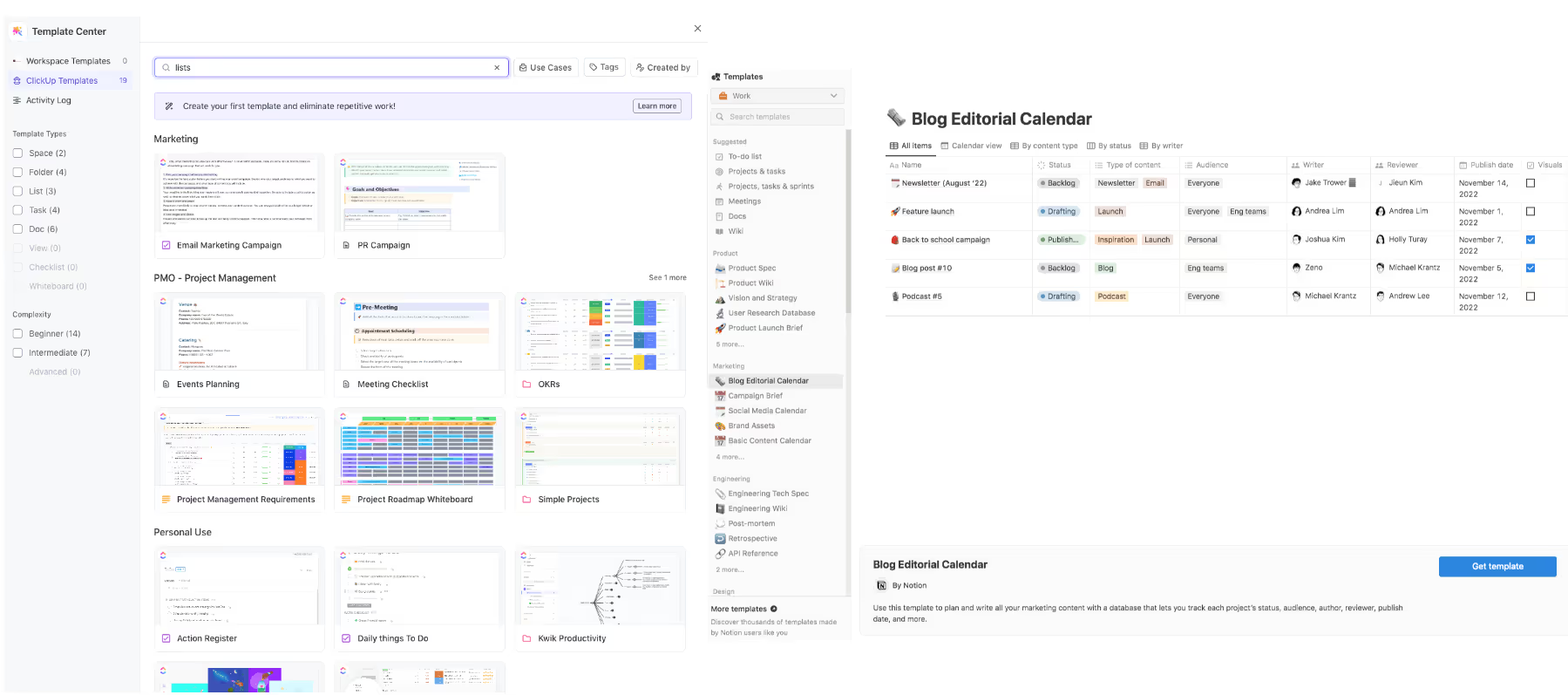
ClickUp and Notion templates
Verdict: Tie
- ClickUp: Best for teams needing project management templates.
- Notion: Appeals to those seeking a wide range of customizable templates for various uses.
ClickUp Automations vs Notion Automations: Streamlining Your Workflow
ClickUp's Advanced Automation
ClickUp offers a robust automation feature, perfect for streamlining tasks and workflows. Key features include:
- Task Filters and Conditions: Target specific goals with ease.
- Trigger-Based Automations: Set up actions based on parameters like start dates.
- Automated Task Assignment: Direct tasks to team members based on expertise.
- Pre-Existing Templates: Efficiently manage time and streamline processes.
Notion's Limited Automation
Notion offers very basic 2-step automations, like reassigning a task if the status changes.
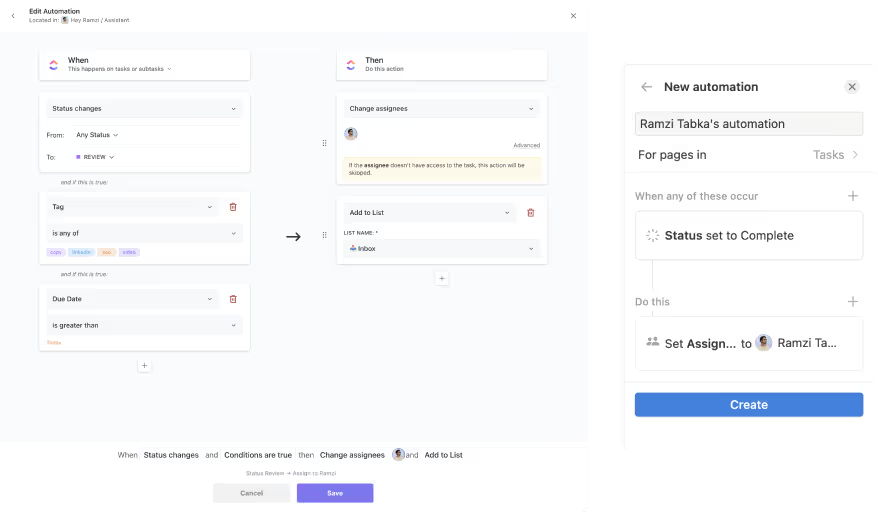
ClickUp vs Notion automations
Verdict: ClickUp
For businesses wanting to automate as much as possible of their processes to get more efficient, ClickUp is the clear choice.
ClickUp Roles and Permissions vs Notion Roles and Permissions
ClickUp and Notion present similar permission levels. Both platforms offer a range from full control to view-only access, ensuring users have the necessary permissions that align with their role within a project. The primary distinction lies in Notion's 'Can edit content' level, which allows users to modify the actual content without changing the overall structure or views of the database.
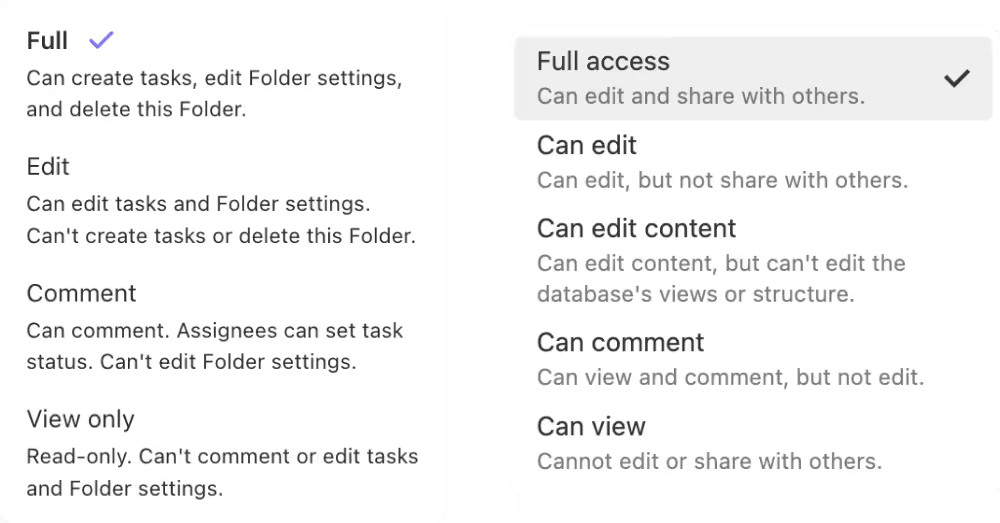
Clickup and Notion permissions
ClickUp's Detailed Permission System
ClickUp provides a comprehensive permission system, featuring:
- Guests: Access to specific items only.
- Members: Varying access levels.
- Admins: Broad management capabilities.
- Owners: Full control, including workspace deletion.
- Custom Roles: Advanced control on higher-tier plans.
This system offers precise control over various workspace elements, ensuring optimal security and efficiency.

Clickup Roles
Notion's Collaborative Permissions
Notion doesn't offer custom roles and granular permission control. But you can have Guests, members, Admin and owners too. While simpler than ClickUp's, Notion's system is effective for document and database collaboration.
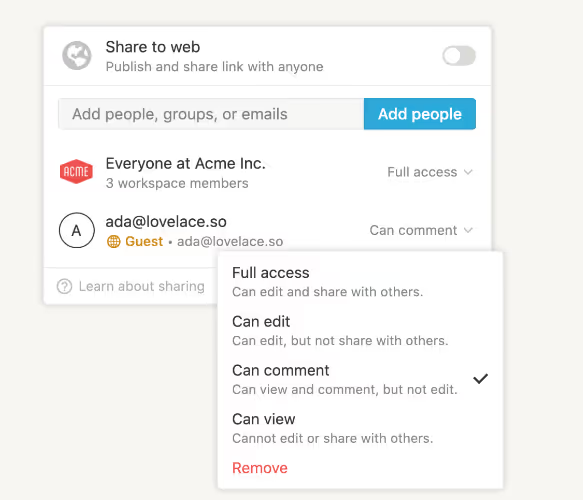
Notion Database Collaboration
Verdict: ClickUp
If security and granular permission management is important for you, ClickUp is the go-to. Otherwise, Notion has more than enough permission capabilities.
ClickUp Relationships vs Notion Relationships: Data Connectivity and Analysis
ClickUp's Limited Relational Tools
ClickUp, while proficient in project management, lacks advanced relational capabilities. This limitation makes it less suitable for tasks requiring data connection and analysis.
Notion's Relational Database Strength
Notion's relational databases allow interconnected datasets to be linked and analyzed as unified views. This adds depth for data correlation.
- Advanced Relational Data Views: Link tables for comprehensive analysis.
- Rollup Columns: Summarize data from other tables.
This functionality is ideal for creating and managing complex datasets, crucial in scenarios like CRM or Logistics systems.
Verdict: Notion
For use cases needing dynamic and interconnected datasets, Notion's advanced data modeling capabilities make it a preferred choice.
ClickUp Formulas vs Notion Formulas: Advanced Calculation Capabilities
Notion's Enhanced Formula Capabilities
Notion's formula features are robust, offering:
- Extensive Function Range: Over 50 functions for complex calculations.
- Advanced Data Manipulations: Supports intricate statistical and date functions.
- Variables Creation: Enhances flexibility in data handling.
Notion is ideal for users needing complex calculations and data manipulations.
ClickUp's Simpler Calculation Approach
ClickUp focuses more on basic arithmetic operations rather than heavy number crunching.
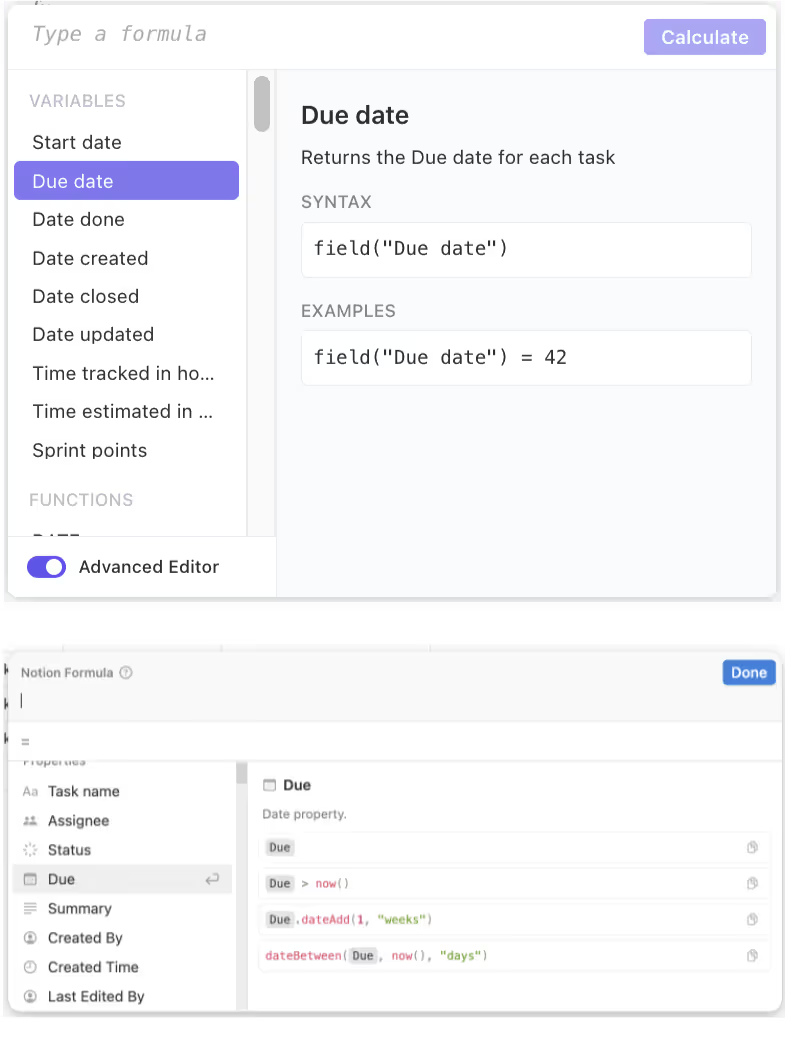
ClickUp vs Notion formulas
Verdict: Notion
For advanced calculation, Notion is the more suitable platform.
ClickUp Dashboards vs Notion Dashboards: Data Visualization and Reporting
ClickUp's Robust Dashboard Features
ClickUp excels in dashboard creation with:
- Graphical Reports: Ideal for tracking project progress.
- Customizable Elements: Burndown charts, Gantt charts, and interactive controls.
- Data Visualization Variety: Supports various view types for insightful reporting.
ClickUp is the go-to for users seeking comprehensive graphical reporting capabilities.
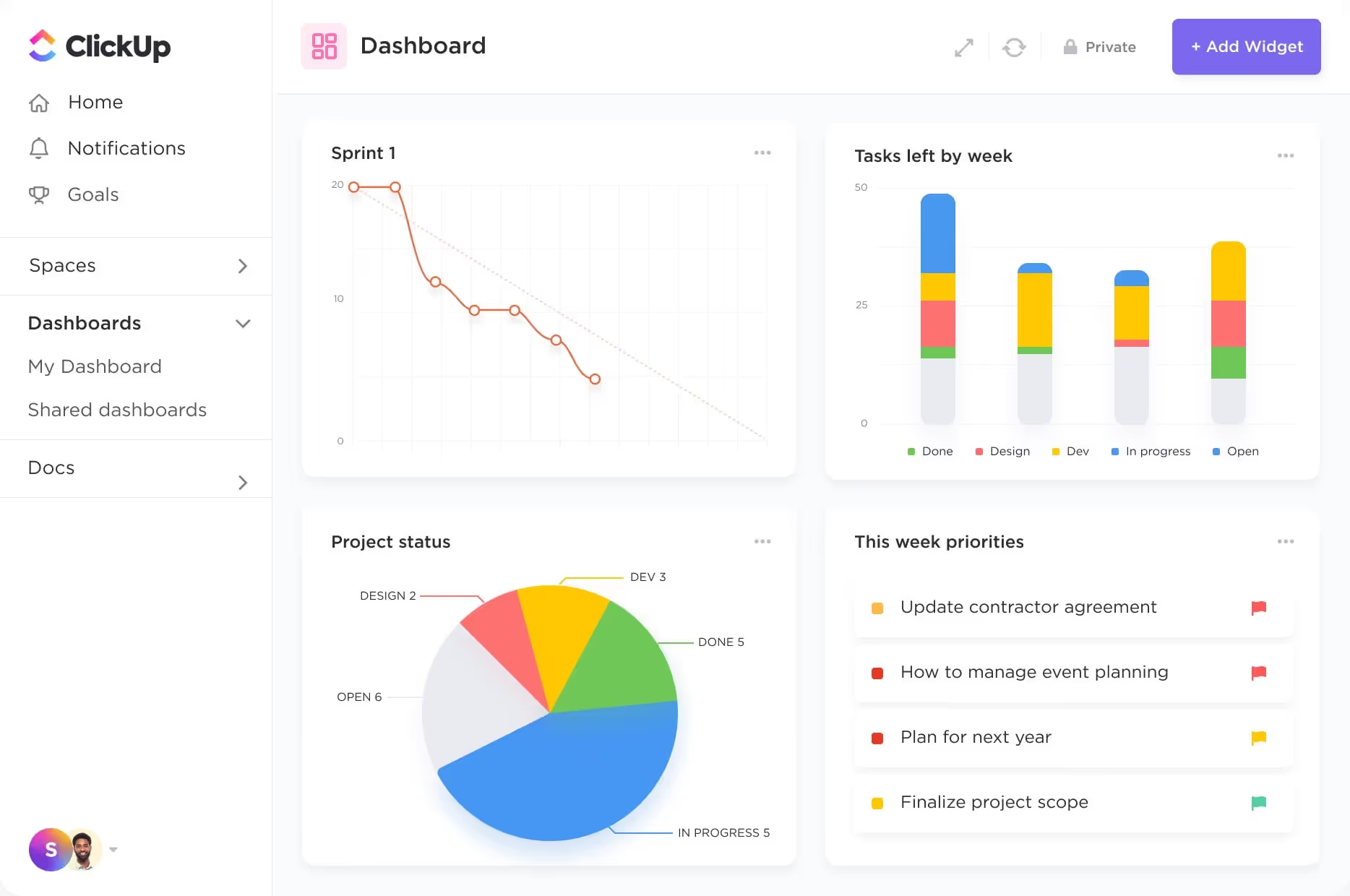
A ClickUp dashboard
Notion's Lack of Native Dashboards
Notion lacks inherent dashboarding and reporting capabilities. Users can build makeshift analytics through creative workarounds.
Verdict: ClickUp
For advanced data visualization and dashboard, ClickUp is the preferable choice.
ClickUp Documentation vs Notion Documentation: Which Excels?
ClickUp's Emerging Documentation Features
While ClickUp is evolving its documentation capabilities, it currently falls short of Notion's versatility. It focuses on:
- Task-Oriented Documentation: Includes checklists and comments related to tasks.
- Doc Editor and Embed Features: Indicate progress in documentation.
Notion maintains an edge in documentation, especially for complex, text, and multimedia-rich documents.
Notion's Excellence in Documentation
Notion stands out with its documentation prowess, characterized by:
- Block-Based Architecture: Effortlessly integrate text, code, images, and more.
- Real-Time Collaboration: Enables simultaneous document editing.
- Rich Template Library: Offers a variety of customizable documentation templates.
This makes Notion ideal for diverse documentation, from company wikis to SOPs. Its user-friendly interlinking and blank canvas approach enhance text-heavy tasks.
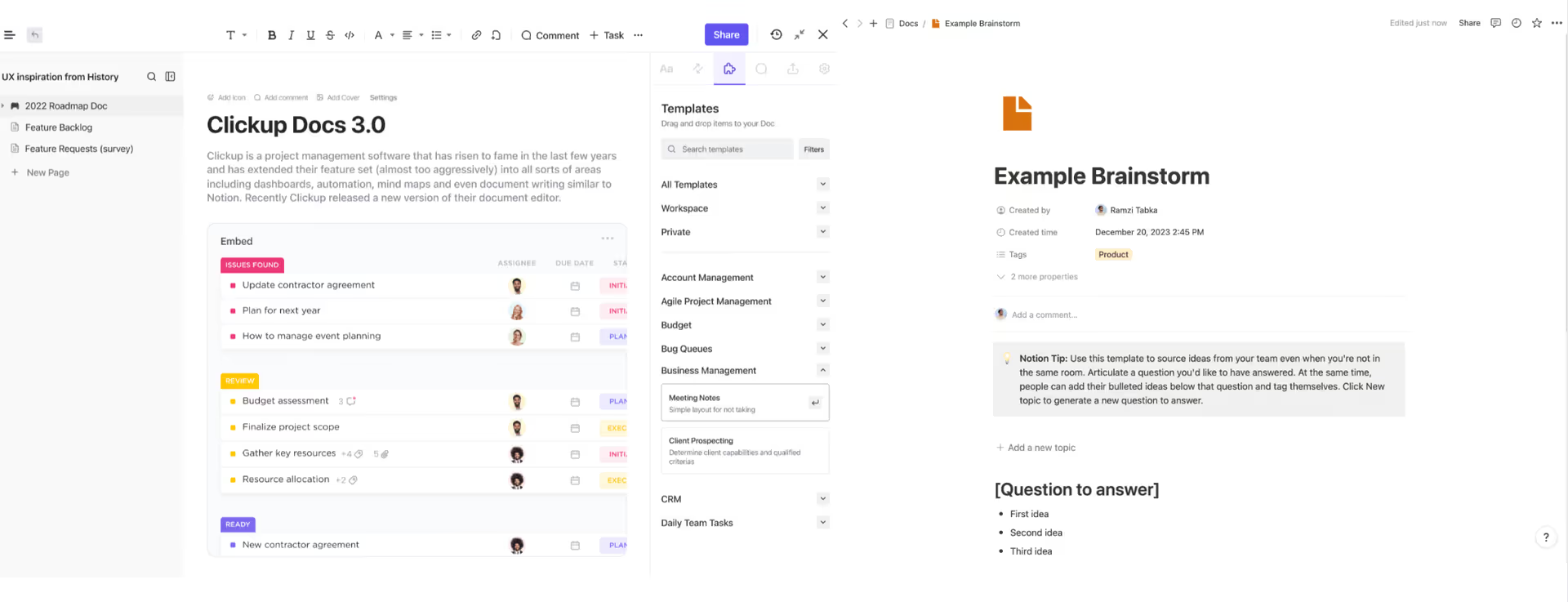
ClickUp and Notion docs
ClickUp Collaboration vs Notion Collaboration: Teamwork and Task Management
ClickUp: A Powerhouse for Team Collaboration
ClickUp excels in team collaboration and task management, offering:
- Assign comments contexts: Discussions link directly to tasks
- Multiple assignees: Shared responsibility
- Granular permissions: Custom team access
- Recurring Tasks Setup: Simplifies task repetition.
- Built-In Time Tracking: Monitors task duration.
- Versatile Task Views: Different perspectives on tasks like kanban boards, or min maps
These features position ClickUp as a top choice for teams, facilitating:
- Time and Task Tracking: Gauge task durations and filter team tasks.
- Diverse Views: Includes brainstorming through whiteboards and customer mapping.
- Efficient Task Assignment: Streamlines recurring task management.
ClickUp's design emphasizes on collaboration, with features like assignable comments and custom statuses, optimizing teamwork coordination.
Notion: Facilitating Basic Collaboration
Notion supports basic collaboration with:
- @Mentions and Page Sharing: Enhances collaborative editing.
- Simpler Permission Settings: Suitable for most collaboration scenarios.
Verdict: ClickUp
ClickUp consolidates task management and teamwork far more effectively.
ClickUp AI Capabilities vs Notion AI Capabilities
ClickUp's AI Integration
ClickUp integrates AI to augment project management, featuring:
- AI in Workspace: Summarizes threads, generates subtasks and rewrites documents.
- Targeted Functionalities: Focuses on project-specific AI enhancements.
- Affordable AI Add-on: Available at $5 per member/month.
Notion's Content-Centric AI
Notion's AI is tailored for content creation, offering:
- Writing Assistance: Enhances style and corrects content.
- Ideal for Content Development: Focuses on content creation and organization.
- Higher Pricing: Priced around $10.
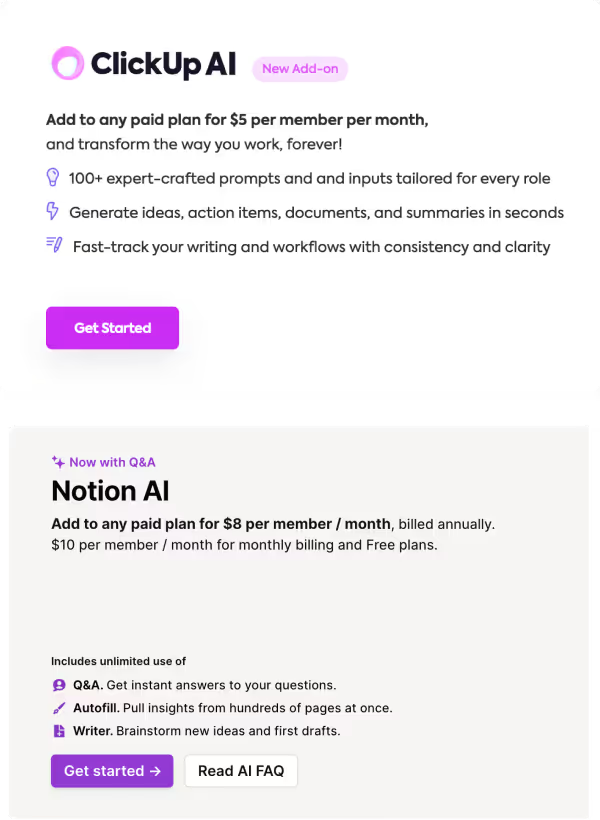
Clickup AI vs. Notion AI
Verdict: Tie
It makes sense that ClickUp approaches AI from a project management perspective, while Notion focuses more on writing. ClickUp having a better value for money, is worth investing in their AI plugin.
ClickUp Integrations vs Notion Integrations
ClickUp's Diverse Integrations
ClickUp integrates with over 100 popular productivity apps including Google Workspace, GitLab, Slack, GitHub, and more. These connections allow you to manage workflows across tools without losing context or having to stitch data together manually.
Notion's Content-Centric Integrations
Notion offers fewer but quality integrations, focusing on content management. Notion's integrations cater to content embedding existing content from other apps.
Verdict: ClickUp
ClickUp really integrates third-party tools for dev or design team in the user's workflow.
Choosing Between ClickUp and Notion: Which is Right for You?
Understanding which tool best fits your requirements is crucial. This process involves two straightforward steps:
1. Assess Your Priorities
To simplify your decision-making process, we've compiled a comprehensive table summarizing key points from this article. Assign a priority level to each feature: critical (3), important (2), or beneficial (1).
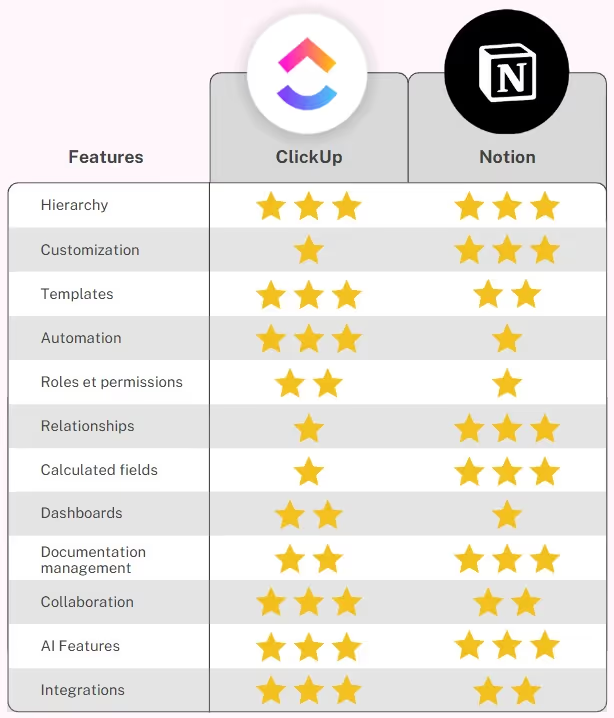
ClickUp vs Notion Score
2. Calculate your Score
For each feature, apply the following scoring system based on its suitability:
- Excellent Fit: Multiply by 10.
- Moderate/Potential Fit: Multiply by 5.
- Poor Fit: Multiply by 1.
Sum up the scores for both ClickUp and Notion. The tool with the higher score better aligns with your specific needs. It's beneficial to perform this exercise individually or with your team for a comprehensive assessment. If you're still doubting a hands-on approach can be helpful: Use the free versions of ClickUp and Notion. Experience their core functionalities to better understand how each aligns with your workflow.
Conclusion
Consider ClickUp if you want to:
- Manage Complex Team Projects
- Automate Workflows
- Facilitate communication
- Monitor projects with dashboards
- Go for the most cost-efficient

ClickUp and Notion integrations
Consider Notion if you want to:
- Manage a small team's documents and projects
- Interlink information across databases
- Organize text-heavy information like wikis
- Customize the look and feel
Both tools are great all-in-one solutions. If you're a structured organization that wants to scale and have processes, ClickUp wins. If you are solo or a small team and lightweight notes and flexibility are higher priorities, choose Notion.

Notion team collaboration features
How UpSys can help you with ClickUp
As a verified ClickUp partner, UpSys has the experience and knowledge necessary to help you get the most out of ClickUp. Whether it's setting up the system, training your teams, or providing technical support, UpSys can ensure a smooth transition to ClickUp. In addition, with our deep understanding of project management and business processes, we're able to help you optimize your workflows and integrate ClickUp into your existing work tools.
🗓 Book a free discovery call with UpSys
